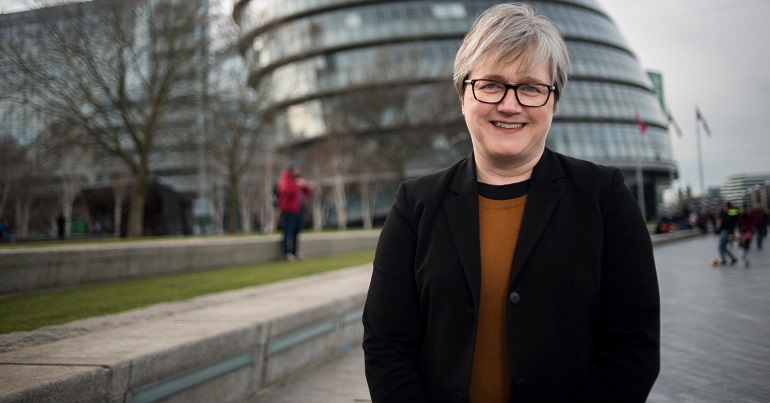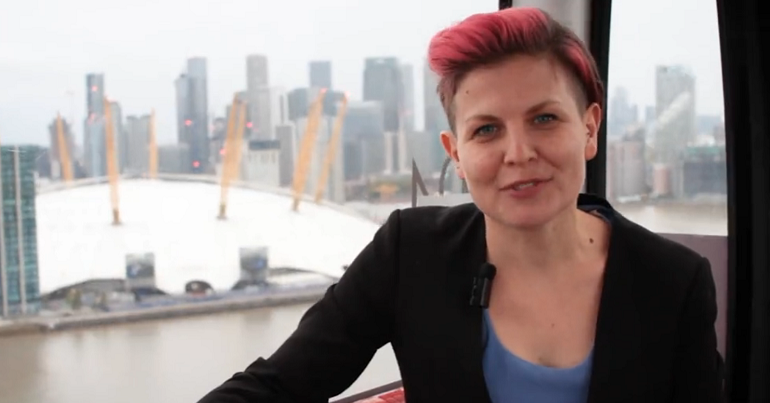Less confrontational, more diverse and more nuanced politics: Caroline Russell on PR in London

London Assembly Member and Islington councillor Caroline Russell has a unique perspective on Britain’s elections – she is elected with First Past the Post on Islington council, and a proportional system (AMS) on the London Assembly.
Until recently, she has been the sole opposition on Labour-held Islington council. But in the London Assembly, she is joined by two other Greens, outgoing Green Party co-leader Sian Berry and recently Zack Polanski.
Russell recently spoke to the Electoral Reform Society ahead of the launch of the Society’s new report, Here to Stay: Two Decades of Proportional Representation in Britain. The ERS interviewed politicians in Scotland, Wales and London for their perspectives and experiences of PR, as well as Westminster’s one-party-takes-all system.
How is it being the sole opposition Councillor in Islington?
I was elected by just an eight-vote margin under [First Past the Post], as the only non-Labour member in 2014. It was a shock election, after 35 Labour and 13 Lib Dems, it went to 47 Labour and one Green. Greens got about 19% of the votes and just 2% of the seats.
I’ve always had a sense that I represent lots of people in Islington. Being the sole opposition councillor was a huge learning curve.
If you’re the only opposition – it affects the way you work. You can’t keep track of everything. You’d never sleep. You have to focus in on a few things.
What gets missed in terms of scrutiny?
You have to do things to bring more people into the council chamber like helping groups of residents and campaigners to submit formal questions and present petitions. I try to be accompanied by Islington residents at Full Council.
On the London Assembly, I was elected in 2016 – Sian Berry and I were a group, we had formal status. That was absolutely transformative – having another elected person with me. We are voted for by 9 million Londoners and have a proportional representation on the Assembly. Our role is entirely a scrutiny role. The Mayor has absolute power, over police, Transport for London (TfL), housing etc.
The Assembly is set up for much more collaborative and cross party working than Islington Council – although the council constitution was updated thanks to my Green councillor predecessor, Katie Dawson on the council from 2006-2010 who had the balance of power between 23 Labour and 24 Lib Dem Councillors. The update means that a sole Councillor can put a motion forward without it being seconded and ungrouped members can have a place on committees. That legacy has stood me in good stead. If the constitution had not been changed, it would have been much tougher.
Does FPTP / PR change how you work as a politician?
The Assembly campaign is run off the back of the Mayor campaign. There’s the manifesto we produce – it’s like our work programme for the 3-year term and builds on past green wins. For example Sian persuaded the Mayor to bring in ballots so residents have a say on demolitions proposed for estate regeneration – that was a complete Green win that the Mayor kept talking about. The fact we’ve been effective as Assembly members boosted all our votes.
Campaigning across the whole of London for Mayor, Assembly list and twelve super constituencies needs many boots on the ground. We get Greens elected via the proportional list vote but we also beat the Conservatives under First Past the Post across the North East constituency (six parliamentary constituencies) where we came second to Labour.
What difference in does proportional representation make?
The council chamber is much more set up for argie-bargie. It’s confrontational, whereas in the Assembly it’s set up to work well cross-party.
It’s cross-party – in scrutiny committees, we agree our reports. When we pass our best Assembly motions it’s when they are cross-party – and we’ve managed to get everyone on board. When it works well, people are looking for and seeking ways to find consensus.
On Crossrail [holding Sadiq to account on delays] – we worked as a pack. It led to a really good Transport Committee report with strong recommendations.
Last year, a member made a transphobic dog whistle comment – I used standing orders to close it down. It led to other Assembly members standing up to speak and say transphobic language had no place in the Assembly. Then the Mayor came out and thanked all of us – a cross-party moment of inclusivity.
We’ve got the Mayor on board with things – through my work we found TfL was only using 0.01% of renewable energy. They should be using power purchase agreements. Now the Mayor is using them, and more renewable energy is being produced and used. Greens take up good ideas and make a persuasive case for them.
Does it affect how Labour operates?
I think the Labour members do take their scrutiny role very seriously. The scrutiny committees are properly cross party.
We’re checking what’s going on and that it is being done as well as it can be – that’s in the Mayor’s interest too. So, when the Assembly is doing its job, we’re making the Mayor work better for Londoners.
One thing that could be improved is that the voting system could be explained more. There is more work that can be done to make Londoners more aware of how the system works.
Another job is to make sure the Mayor uses the powers he has. Businesses, think tanks and all the transport and climate NGOs are calling for smart road pricing. It needs to happen but the Mayor is not yet listening to us on that.
What would it be like if it was FPTP?
You just wouldn’t have that diversity of ideas. You’ve had greens on the assembly from the very beginning. Look at [former Green AM] Darren Johnson on equal marriage. One of his first [questions] to Ken Livingstone was about whether Ken would bring in [a] scheme to register gay couples as the equivalent of marriage. They introduced that scheme later that year. It didn’t have any legal weight – but it was one step along the way to equal marriage. That’s the kind of difference having us around makes. It’s step by step. With PR you do get a broader range of voices.
That meant we had two people from UKIP in the last Assembly term. They were elected – and they didn’t get re-elected. Apparently the BNP member (2008-2012) rarely turned up.
What do you think PR would change at Westminster?
It would bring a diversity of voices into Westminster. When I stand up in the council chamber, I think I represent something between 17 and 19% of Islington residents – but I’m just 2% of the seats in the chamber.
In the Assembly, I stand with other Greens and we have among that body a proportionate presence. I think the Greens add another perspective the Assembly is the richer for having that diversity.
Most London councils are super-majority Conservative or Labour. The election cycle requires grit and determination to keep trying to getting elected. If you don’t get elected, it’s a big ask to keep campaigning.
People tell me the Assembly election is ‘the only time I get to vote for a Green who can win’. That’s worrying. People know that the voting system makes it hard to get their preferred candidate elected.
What do you make of attempts by the government to roll back preferential voting for Mayors and PCCs?
It’s such a bad idea. If you look at the votes, it’s really interesting how people use first and second preferences – it allows for a much more nuanced picture of what people want. People that win are aware that a lot of Londoners voted for Sian Berry 2nd preference. A very decent number voted for her as 1st pref. The person that wins has to think about what all those voters may be thinking of and wanting.
PS. We hope you enjoyed this article. Bright Green has got big plans for the future to publish many more articles like this. You can help make that happen. Please donate to Bright Green now.
Image credit: Chris King Photography
Editor’s note: This article was edited on August 9 to improve clarity on quotes.




The london assembly is a waste of money
Looks like a hard but good beginning ?